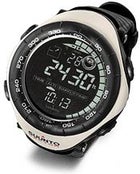The thing is, all altimeters work off barometric pressure. That’s how the gadgets know you’re going up or down聴changing air pressure as you ascend or descend pushes in or pulls out a tiny membrane that then triggers the sensor that measures elevation gain and loss. So, changes in atmospheric pressure due to shifts in weather certainly will change your altimeter reading.
 Suunto Vector
Suunto Vector
Is that a big deal? Not really. My experience has been that at night聴when my elevation stays constant while I sleep聴I’ve seen at most swings of 40 to 50 feet. That’s not going to screw up your navigation by any stretch of the imagination. Besides, because altimeters are really just barometers, all of the wrist-mounted ones have a barometer function that reads out air pressure in millibars. They also allow you to measure the change overnight, so you can adjust your elevation accordingly.
As for which altimeter to buy, the Suunto Vector is pretty much the gold standard ($215; www.suunto.com). It has altimeter functions accurate to ten feet, plus compass, thermometer, and barometer, and of course time and date modality. Not bad looking, either. But, I remain loyal to my Avocet Vertech II ($170; www.avocet.com), even though few retailers still stock them due to Suunto’s market dominance. I personally think the Vertech is more accurate and easier to use than more modern watches. But then, I still lug around film cameras, too.


